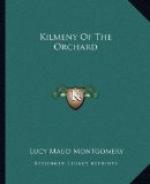“Her mother told her she was,” said Eric, rather bitterly.
“Ah!” Janet shot a quick glance at the picture of her sister. “Was that it? Margaret was a strange woman, Master. I suppose she thought her own beauty had been a snare to her. She was bonny. That picture doesn’t do her justice. I never liked it. It was taken before she was—before she met Ronald Fraser. We none of us thought it very like her at the time. But, Master, three years later it was like her—oh, it was like her then! That very look came in her face.”
“Kilmeny doesn’t resemble her mother,” remarked Eric, glancing at the picture with the same feeling of mingled fascination and distaste with which he always regarded it. “Does she look like her father?”
“No, not a great deal, though some of her ways are very like his. She looks like her grandmother—Margaret’s mother, Master. Her name was Kilmeny too, and she was a handsome, sweet woman. I was very fond of my stepmother, Master. When she died she gave her baby to me, and asked me to be a mother to it. Ah well, I tried; but I couldn’t fence the sorrow out of Margaret’s life, and it sometimes comes to my mind that maybe I’ll not be able to fence it out of Kilmeny’s either.”
“That will be my task,” said Eric.
“You’ll do your best, I do not doubt. But maybe it will be through you that sorrow will come to her after all.”
“Not through any fault of mine, Aunt Janet.”
“No, no, I’m not saying it will be your fault. But my heart misgives me at times. Oh, I dare say I am only a foolish old woman, Master. Go your ways and bring your lass here to look at your plaything when you like. I’ll not make or meddle with it.”
Janet betook herself to the kitchen and Eric went to look for Kilmeny. She was not in the orchard and it was not until he had searched for some time that he found her. She was standing under a beech tree in a field beyond the orchard, leaning on the longer fence, with her hands clasped against her cheek. In them she held a white Mary-lily from the orchard. She did not run to meet him while he was crossing the pasture, as she would once have done. She waited motionless until he was close to her. Eric began, half laughingly, half tenderly, to quote some lines from her namesake ballad:
“’Kilmeny, Kilmeny,
where have you been?
Long hae we sought baith holt
and den,—
By linn, by ford, and greenwood
tree!
Yet you are halesome and fair
to see.
Where got you that joup o’
the lily sheen?
That bonny snood o’
the birk sae green,
And those roses, the fairest
that ever was seen?
Kilmeny, Kilmeny, where have
you been?’
“Only it’s a lily and not a rose you are carrying. I might go on and quote the next couplet too—
“’Kilmeny looked
up with a lovely grace,
But there was nae smile on
Kilmeny’s face.’




